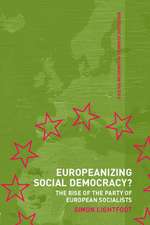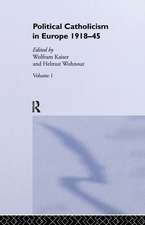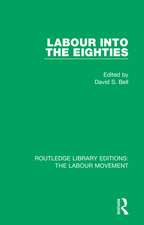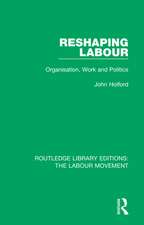Italy, Europe, The Left: The Transformation of Italian Communism and the European Imperative: Routledge Revivals
Autor Vassilis Fouskasen Limba Engleză Hardback – 18 sep 2018
| Toate formatele și edițiile | Preț | Express |
|---|---|---|
| Paperback (1) | 216.07 lei 6-8 săpt. | |
| Taylor & Francis – 30 iun 2020 | 216.07 lei 6-8 săpt. | |
| Hardback (1) | 625.03 lei 6-8 săpt. | |
| Taylor & Francis – 18 sep 2018 | 625.03 lei 6-8 săpt. |
Din seria Routledge Revivals
- 9%
 Preț: 801.69 lei
Preț: 801.69 lei - 8%
 Preț: 432.15 lei
Preț: 432.15 lei -
 Preț: 153.81 lei
Preț: 153.81 lei -
 Preț: 230.80 lei
Preț: 230.80 lei -
 Preț: 294.72 lei
Preț: 294.72 lei -
 Preț: 258.66 lei
Preț: 258.66 lei - 9%
 Preț: 764.34 lei
Preț: 764.34 lei - 9%
 Preț: 903.41 lei
Preț: 903.41 lei -
 Preț: 296.10 lei
Preț: 296.10 lei -
 Preț: 342.36 lei
Preț: 342.36 lei - 9%
 Preț: 606.35 lei
Preț: 606.35 lei -
 Preț: 317.54 lei
Preț: 317.54 lei - 9%
 Preț: 764.28 lei
Preț: 764.28 lei -
 Preț: 256.94 lei
Preț: 256.94 lei -
 Preț: 238.40 lei
Preț: 238.40 lei -
 Preț: 259.47 lei
Preț: 259.47 lei - 9%
 Preț: 903.80 lei
Preț: 903.80 lei -
 Preț: 326.26 lei
Preț: 326.26 lei -
 Preț: 258.66 lei
Preț: 258.66 lei -
 Preț: 294.97 lei
Preț: 294.97 lei -
 Preț: 308.89 lei
Preț: 308.89 lei -
 Preț: 199.85 lei
Preț: 199.85 lei -
 Preț: 339.90 lei
Preț: 339.90 lei -
 Preț: 295.04 lei
Preț: 295.04 lei -
 Preț: 382.23 lei
Preț: 382.23 lei -
 Preț: 258.66 lei
Preț: 258.66 lei -
 Preț: 343.21 lei
Preț: 343.21 lei - 9%
 Preț: 640.90 lei
Preț: 640.90 lei - 9%
 Preț: 619.48 lei
Preț: 619.48 lei -
 Preț: 228.88 lei
Preț: 228.88 lei -
 Preț: 257.67 lei
Preț: 257.67 lei -
 Preț: 245.10 lei
Preț: 245.10 lei -
 Preț: 258.52 lei
Preț: 258.52 lei -
 Preț: 258.66 lei
Preț: 258.66 lei -
 Preț: 368.93 lei
Preț: 368.93 lei -
 Preț: 246.37 lei
Preț: 246.37 lei - 9%
 Preț: 832.07 lei
Preț: 832.07 lei -
 Preț: 258.66 lei
Preț: 258.66 lei -
 Preț: 286.98 lei
Preț: 286.98 lei - 18%
 Preț: 695.85 lei
Preț: 695.85 lei - 9%
 Preț: 934.94 lei
Preț: 934.94 lei - 5%
 Preț: 231.22 lei
Preț: 231.22 lei -
 Preț: 267.15 lei
Preț: 267.15 lei -
 Preț: 200.66 lei
Preț: 200.66 lei - 9%
 Preț: 638.61 lei
Preț: 638.61 lei -
 Preț: 259.68 lei
Preț: 259.68 lei - 9%
 Preț: 1038.45 lei
Preț: 1038.45 lei -
 Preț: 389.43 lei
Preț: 389.43 lei -
 Preț: 302.13 lei
Preț: 302.13 lei -
 Preț: 294.72 lei
Preț: 294.72 lei
Preț: 625.03 lei
Preț vechi: 839.00 lei
-26% Nou
Puncte Express: 938
Preț estimativ în valută:
119.60€ • 125.45$ • 99.56£
119.60€ • 125.45$ • 99.56£
Carte tipărită la comandă
Livrare economică 01-15 aprilie
Preluare comenzi: 021 569.72.76
Specificații
ISBN-13: 9781138323384
ISBN-10: 1138323381
Pagini: 269
Dimensiuni: 152 x 219 mm
Greutate: 0.45 kg
Ediția:1
Editura: Taylor & Francis
Colecția Routledge
Seria Routledge Revivals
Locul publicării:Oxford, United Kingdom
ISBN-10: 1138323381
Pagini: 269
Dimensiuni: 152 x 219 mm
Greutate: 0.45 kg
Ediția:1
Editura: Taylor & Francis
Colecția Routledge
Seria Routledge Revivals
Locul publicării:Oxford, United Kingdom
Cuprins
Part 1: Roads to Modernity: The Post-War Strategy of the PCI 1943-1980 1. Modernization or Populist Insurrection? Consensus Pattern of Reconstruction, 1943-1950 2. Roads to Modernity, 1950-1980: Rapid Development, Social Mobility, Crisis and Compromise Part 2: Polity Crisis, The European Imperative and the Transformation of Italian Communism 1980-1992 3. The Crisis of Keynesianism and its Impact on PCI Strategy, 1980-1987 4. New Revisionism and Alternative Discourses of Transformation 5. Governing the Party Crisis (1): The Retreat of New Revisionism in the 19th Congress (March 1990) 6. Governing the Party Crisis (2): Internal Realignments and Ambiguous Identities 7. New Revisionism vs. Communist Refoundation: Once Again on the Questione Salariale 8. A Tentative Conclusion.
Recenzii
’...invaluable to anyone wishing to understand the vicissitudes of the Italian Communist Party in face of transformations of the modern world and the collapse of Communism.’ Professor Donald Sassoon, Queen Mary and Westfield College, University of London, UK ’In an attempt to retrace the crisis and transformation of the Italian Communist Party (PCI) into the Democratic party of the left, this essay sets it into the social, economic and especially political context - the crisis of the Italian political system - at the time, rejecting simplistic explanations.’ The International Spectator ’This is a stimulating contribution to the debate on the PCI/PDS...’ Political Studies ’...well-argued, well-researched and copiously footnoted.’ The Voice of the Turtle ’The author has used an impressive range of primary sources...’ South European Society & Politics
Descriere
Published in 1998, this book debates conventional views and examines the extent to which the end of the Cold War has contributed to a redefinition of the Left’s identity in Italy and Europe. The exemplary methodological framework and the wider European perspective adopted throughout, make the book an indispensable reading in the field of Italian and European politics.

























